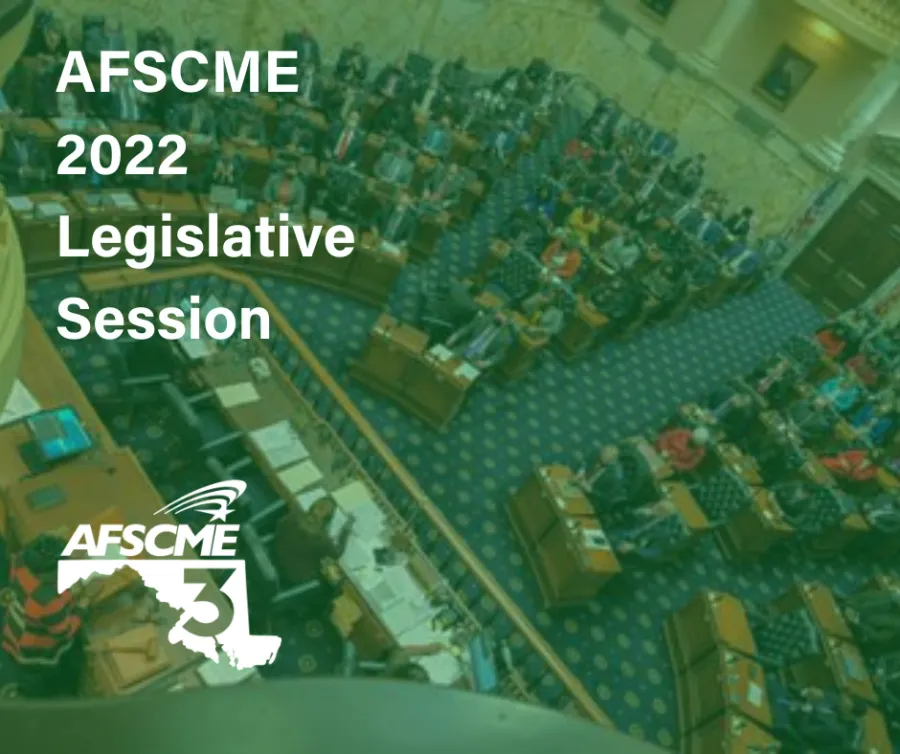2022 Legislative Agenda: AFSCME Fights to Strengthen the Law for Workers

This year, members of AFSCME Council 3 are pursuing a robust legislative agenda including strengthening and expanding collective bargaining. Check out the pieces of legislation we are following below.
In addition, each year the Legislature holds hearings on the Governor's proposed budget for every agency. These "budget hearings" are an excellent opportunity for frontline workers to have their voices heard about how underfunding and understaffing impact our work. Typically representatives from management are the only individuals to testify which is why it's urgent that as many members testify as possible.
Check out the schedule for budget hearings here! Don't hesitate to reach out for more information by contacting our office at 410.547.1515 or emailing info@afscmemd.org
2022 Legislative Agenda
Office of Public Defender Merit Status and Collective Bargaining Rights
(SB 255 - Sen. Beidle / HB 90 - Del. Henson)
Under present law, Maryland Office of Public Defender core support staff and social workers are considered “merit” employees, but frontline attorneys are considered “special appointment” employees, making their employment “at will” and denying them many of the basic rights and opportunities provided to merit-based state employees. This legislation would remove the special appointments status of OPD attorneys and place them within the state’s merit-based system, and then grant ALL Office of Public Defender staff the right to collectively bargain.
On January 18 Del. Shaneka Henson solo testified in favor of the legislation – a positive sign for AFSCME because no other testifiers were required!
Create Binding Arbitration (SB 472 - Sen. Kramer / HB 458 - Del. Korman)
Under present Maryland law, if there are unresolved collective bargaining disputes between the State and the exclusive representative, factfinders can be appointed to review and make nonbinding recommendations based on proposals submitted by labor and management. However, there is no requirement for these recommendations to be adopted. There is no process for mediation. There is no process for binding arbitration. And it is illegal for public employees to strike. This effectively puts the exclusive employee representative at the mercy of management to accept their proposed settlement.
This legislation would create a process for dispute resolution and binding arbitration, creating a more level playing field for employees and employers to bargain in good faith.
Stop the Closure of Deer's Head and Western Maryland Hospital Centers
In the Maryland Department of Health’s “2041 Facilities Master Plan” they state one of their goals is “Identifying strategic partners to transfer services from Western Maryland Hospital Center in Hagerstown and Deer’s Head Hospital Center in Salisbury to healthcare and community providers”.
These hospitals serve chronically ill individuals and those with severe disabilities, including brain trauma patients and those with severe kidney disease. They also provide long-term respiratory care, which is so important during COVID. The patients served are also classically those with few financial resources – not viable clients for assisted living or nursing home sites.
There ARE NO strategic partners to transfer these services to on the Shore or Western Maryland. We should be rebuilding these hospital centers, not closing them. And we can do this by accessing the State’s surplus through the Capital Budget to enhance the services provided, not privatizing them.
Studying the Impact of “Long COVID” Upon the State’s Workforce
The concept of “Long COVID” – debilitating symptoms that last long after “recovery” from a COVID-19 infection – is gaining more acceptance but little is known of its causes or why some suffer from it and others do not. Council 3 is working with legislators and staff in the General Assembly, as well as outside experts at Johns Hopkins and the State Retirement and Pension System, to develop study language to insert in this year’s budget that would lay the groundwork for a better understanding of the illness. Better understanding could lead to an expansion of leave due to Long COVID, and even establish a temporary disability benefit.
Saint Mary’s College of Maryland COLA (SB 332 – Sen. King / HB 54 – Del. Crosby)
Under present law, the State and SMCM are supposed to bear the cost of COLAs 50/50. However, the school has declined repeatedly to hold up its end of the bargain, citing financial constraints to the detriment of the school’s employees. This legislation would have the State pick up the other 50% of the costs and hold SMCM harmless going forward.
20 Year Retirement for DJS Case Management Specialists
(SB 231 – Sen. Jackson / HB 763 - Del. Bridges)
Despite having virtually the same duties and responsibilities as Parole & Probation Agents, Department of Juvenile Services Case Management Specialists does not qualify for the same retirement benefit. This legislation would correct this injustice by placing them, and Group Life Managers, into CORS. The legislation will be amended in committee to reflect changes needed because of a bill drafting error.
